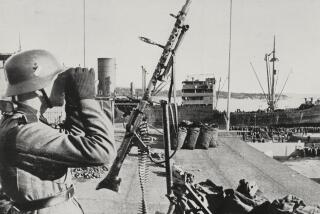Limits on GIs in Bosnia Hide ‘Human Face’ of Peace
- Share via
TUZLA, Bosnia-Herzegovina — American soldiers in flak jackets and helmets worked long hours last week fortifying the front gate of the air base here, filling metal cages with stones to hold off “an enemy attack,” as one soldier described it.
Norwegian troops, also part of the NATO deployment in Bosnia, were hard at work as well, packing up their belongings for a move to a new outpost in Bosnian Serb territory.
When the Americans called it quits for the day, they retreated to their tents, only then shedding their weapons and body armor. The Norwegians took off for downtown Tuzla, where a fellow soldier was singing with a local choir. Helmets, vests and guns were checked curbside.
“The Norwegians are very liked in our town, because they are not just soldiers but also human beings,” said Nedzmija Omercehajic, head of the Tuzla Music High School, sipping coffee with several Norwegians after the performance. “The Americans are acting like policemen. I don’t know why they seem so afraid here.”
It has been more than a month since Americans arrived in Tuzla, and the massive show of strength--more than 600 military flights carrying 10,000 tons of cargo, 1,000 vehicles and 3,500 people--is beginning to fray some nerves here.
Residents in Tuzla say they are frightened by the military might. Peacekeepers from European countries complain of American overkill. And some U.S. troops say they are fed up with a security policy that prevents them from even stepping off base to meet the people they came here to help.
*
“You have to be safe,” said Senior Airman Mark Brown of San Diego, patrolling the front gate with an explosives-sniffing dog. “Still, I would like to go out and see what is going on here.”
U.S. military officials say the troops shouldn’t expect changes any time soon. Keeping American soldiers alive and avoiding even an appearance of partiality--something, they fear, that would invite retaliation against Americans--require tight controls on mingling with Tuzla residents.
“It doesn’t hurt to go slowly and cautiously,” said Lt. Col. Michael D. Clay, who oversees civilian-military operations for Maj. Gen. William L. Nash, the American commander. “Force protection is a very big deal.”
The restrictions have annoyed some American military chaplains, who were barred from attending recent Serbian Orthodox Christmas services, a lost opportunity, they argued, to build figurative bridges with Bosnian Serbs. Norwegian troops, when stationed in Tuzla as part of the United Nations peacekeeping mission that preceded the NATO operation, not only attended such services but also drove an Orthodox priest from Bosnian Serb territory to officiate.
Four hundred pounds of blankets and coats, meanwhile, sent to the Air Force for distribution to needy people, have been stranded at the base because of a ban on such community outreach. Soldiers manning checkpoints have been ordered not to give handouts to begging children, and even leftover meals are being thrown away rather than offered to local residents.
“If I have to get it cleared, it will never happen,” said Father Stephen Booth, a Roman Catholic chaplain in the Air Force who carried a shoe box of candy and toys to the front gate to offer to children. “It is easier to get forgiveness than permission around here.”
Critics of the American approach say more is at stake than image. By failing to reach out to the Tuzla community, they contend, Americans are teaching Bosnians peace without a human face. Bosnians of all ethnicities, they say, respect military might, but they also need lessons in humanity.
“It is like a fourth group has joined the warring factions,” said Rupert Wolfe Murray, an independent Scottish consultant to the Tuzla city government. “We had the Chetniks [Serb nationalists], Muslims and Croats, and now we have the American soldiers. They may be the good guys, but they are so secluded on the base nobody knows it.”
U.S. military officials defend the American approach, saying they have their hands full with military aspects of the North Atlantic Treaty Organization deployment and would rather leave the humanitarian side to other international organizations.
Clay, the civil operations officer, said his top priorities are to ensure that Bosnians do not interfere with the NATO Implementation Force, known as IFOR, and that the peacekeeping operation causes the least possible disruption for local residents.
*
Instructions to U.S. soldiers not to feed local children, for example, are meant to protect the children, he said. Handing out food, he said, encourages children to gather around IFOR vehicles, increasing the likelihood of an accident. Several such accidents occurred during the U.N. mission.
“There are a lot of players on the field, including about 70 international organizations,” Clay said. “We are going to focus on the military mission and hope to get the conditions set so these other players can do their part.”
Tuzla residents say they understand the American emphasis on military security, but they do not understand why it requires such drastic measures in Tuzla, a relatively peaceful town during the war, where Muslims, Croats and Serbs still live together.
Norwegian peacekeepers were well-known within the U.N. for suffering few casualties, an achievement due in large part to their cordial relations with all sides, several residents said. American peacekeepers, even under the new IFOR umbrella, could benefit from that experience, they said.
“One of the Norwegian doctors helped save some kids’ lives in Tuzla during the war,” said Nada Mladina, a Bosnian Serb pediatrician. “Those kinds of relations were created because the Norwegians got the OK from their government. People are glad the Americans have come, and they expect a lot from them. We would like the same good spiritual and cultural contacts.”
Tuzla Mayor Selim Beslagic said he will give the Americans one more month before he insists upon greater interaction between the base and city residents.
Tuzla not only has 1,000 years of history to offer American soldiers, he said, but also “human contact” between Americans and Bosnian Muslims, Croats and Serbs could help heal battle wounds among all sides.
“It would increase the chances of the IFOR mission succeeding,” Beslagic said. “The Americans do their jobs as soldiers excellently--it will be a great loss if they don’t also establish contact on the human side.”
The Norwegians, who operated the air base for the U.N., said they offered advice to Nash and his staff about reaching out to the community, but they held out little hope that things will change during the yearlong IFOR deployment.
“They still are talking about the enemy,” said Lt. Arnstein Hansen, a Norwegian logistics officer who sang “Fiddler on the Roof” with the Tuzla choir. “We are here to keep the peace. Who is the enemy?”
At the air base front gate, Airman Brown looked the other way as guards slipped candy to a crowd of kids, some dressed in shabby clothes and one wearing a pair of sandals as winter boots.
Sometimes, Brown said, a soldier just has to bend the rules.
More to Read
Sign up for Essential California
The most important California stories and recommendations in your inbox every morning.
You may occasionally receive promotional content from the Los Angeles Times.













